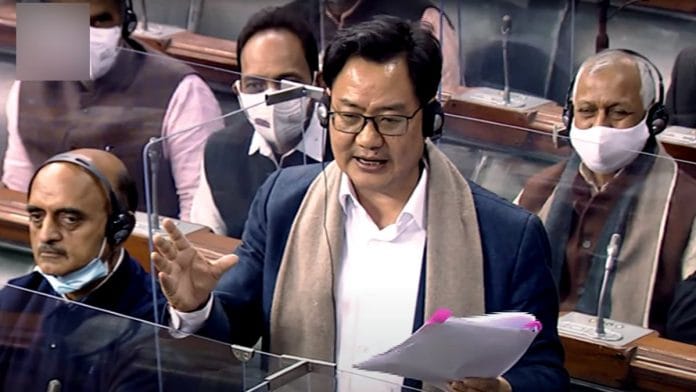New Delhi: The Lok Sabha passed the Election Laws (Amendment) Bill, 2021, Monday within 20 minutes of its introduction by Union Law Minister Kiren Rijiju, amid an uproar by the Opposition over the manner in which this was done.
The bill seeks to allow the interlinking of Aadhaar numbers with voter ID numbers in order to “purify electoral rolls” of voters as Indian citizens and for authentication of entries, among other changes to the law. It would allow electoral registration officers to ask for Aadhaar numbers of persons registering as voters.
The bill was introduced by Rijiju under a supplementary agenda at 2:47 pm and passed by a voice vote at 3:10 pm, even as Opposition MPs questioned the need to pass the bill in a hurry.
Both the Biju Janata Dal (BJD) and YSR Congress Party (YSRCP), which are not aligned with the government but have supported many of its legislations in the past, questioned the manner in which the bill was passed, stating that it requires “proper discussion”. They were joined by Opposition parties.
Also read: Modi govt tells EC it will amend laws to link Aadhaar with voter IDs to enable remote voting
Amendments proposed by government
“The existing law has certain disparities and shortfalls. To get rid of this, the government is working in tandem with the Election Commission (EC). Keeping in mind the recommendations of the EC, we’ve incorporated some changes to the law through this bill,” said Rijiju while introducing the bill.
“We want the electoral roll in the country to stay genuine. We are therefore introducing a provision that the Aadhaar card that ordinary citizens have can be linked to voters’ ID. This is voluntary, not compulsory,” said Rijiju.
About another amendment, he stated, “Constitutionally, we know that a citizen gets voting rights when they turn 18. However, according to the provisions now, many are left out of the electoral rolls even after turning 18. This is because in the system, 1 January is the qualifying date.”
According to the amendment, said Rijiju, four qualifying dates will be declared for updating the voting rolls to include those who have turned 18 — the first day of the months of January, April, July and October.
He added that the language for registration of ‘service voters’ (those serving in the armed forces, armed police forces of a state serving outside it and government employees posted outside India) — which currently says that ‘wives’ of such voters can also be registered as service voters — will be made more “gender-neutral”.
“Wife will now be replaced by ‘spouse’,” said Rijiju.
‘Not proper decorum’
It was the third and final amendment, which seeks to link Aadhaar numbers with voter ID numbers, that triggered the protests. Many Opposition MPs gathered in the well of the House to show their displeasure.
While Opposition parties questioned the constitutionality of linking Aadhaar — still not seen as a proof of citizenship — with the voter ID, others asked why the government was in such a hurry to pass the bill that clearly needed a debate.
“This bill needs to be discussed. We welcome gender neutrality, but we have experience from Telangana and Andhra Pradesh. In the Telangana election of 2015-16, 30 lakh people couldn’t vote! And in Andhra, because of the linkage with Aadhaar, the previous government could go ahead and see who should be given what, and what should be taken away from whom. I request the minister to come with a comprehensive bill so that proper discussion can happen in the House,” said YSRCP MP Lavu Sri Krishna.
When Aadhaar was linked with the electoral photo identity card data in Andhra and Telangana by the Election Commission in 2015, nearly 55 lakh names were left off the rolls.
The BJD, meanwhile, said this was “not the proper decorum” to pass a bill.
“I appreciate that the honourable minister said that there will be four chances for qualification and that it will be gender-neutral. But this is not the proper decorum or the proper way to pass any bill. It was supposed to be introduced today…. It should be debated and discussed with all the parties and only then should it be passed,” said BJD MP Anubhav Mohanty.
Objection across parties
The government’s passing of the bill in a rush, without sufficient discussion, was also raised by the Congress, the Dravida Munnetra Kazhagam (DMK), the Bahujan Samaj Party (BSP), the Revolutionary Socialist Party (RSP), the Nationalist Congress Party (NCP), the Shiv Sena and the All India Majlis-e-Ittehadul Muslimeen (AIMIM).
“Entire democracy is being taken away. This bill needs discussion,” said Trinamool Congress MP Kalyan Banerjee.
“The bill was introduced today, what is the tearing hurry?” asked NCP MP Supriya Sule. “If the honourable minister wants electoral reforms, then he should take this bill back, talk about women’s reservation, electoral reforms,” she added.
Asaduddin Owaisi of the AIMIM said the bill was “taking away the autonomy of the Election Commission”.
All of them were cut short by the Speaker while presenting their arguments.
“We had asked the government in the morning why this bill is being introduced as well as being slotted to be passed today. If this bill is so important, why pass it in a hurry? We also asked that the bill be sent to a standing committee,” said Congress’ leader in the Lok Sabha, Adhir Ranjan Chowdhury.
‘Purify the rolls’
Responding to Chowdhury, Rijiju said the recommendations have come from the Standing Committee of Law and Personnel itself, and read out parts of the report by the panel.
“The committee is of the view that linking of Aadhaar number with electoral rolls will purify the electoral rolls and consequently reduce electoral malpractices,” Rijiju read from the report, adding that the committee had also asked for an action-taken report.
The bill was thereafter passed by a voice vote.
(Edited by Saikat Niyogi)
Also read: Disruption in Parliament isn’t new. But there was a new aggression in this monsoon session






